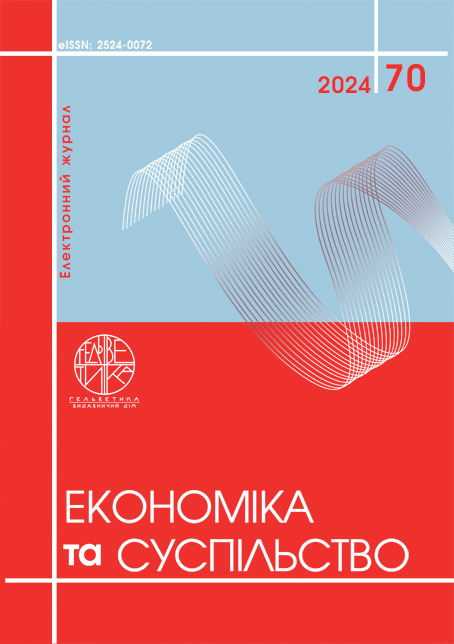ORGANISING EFFECTIVE INTERACTION OF MANAGERS OF ARCHITECTURAL AND CONSTRUCTION COMPANIES WITH CLIENTS BASED ON THE THEORY OF NON-VIOLENT COMMUNICATION
Abstract
Based on the theory of non-violent communication, the article deals with the problem of organising effective interaction of managers of architectural and construction companies with clients. The authors emphasise that since clients have high demands and expectations that need to be skilfully taken into account, ensuring quality communication with clients is a key task for modern managers in this field. The article examines the current trends and problems that the managers of architectural and construction companies have to face in the process of interaction with their clients. Key issues include ineffective management of client requirements, failure to meet agreements and deadlines, inadequate communication support and inadequate response to changing client needs. It is noted that an important role in solving these problems is played by the ability of managers to organise high quality communication that gives customers a sense of attention, understanding and trust. The theory of non-violent communication, developed by the psychologist Marshall Rosenberg, is described in some detail. It is a universal model for building effective relationships in many areas of life, based on empathy, acceptance of the other person and compassion. The key components of non-violent communication are analysed, such as non-judgmental observation, distinction between feelings and thoughts, understanding of the client’s wishes and the ability to formulate constructive requests. Examples are given of how to apply these principles in practice when dealing with architectural and construction managers and clients. The importance of using the theory of non-violent communication to build trust, avoid conflict, enhance reputation and achieve positive business results is demonstrated. Specific recommendations, including conducting training, creating internal communication standards, implementing a customer feedback system, and developing active listening and empathy skills, are provided to improve managers’ communication practices. An algorithm for effective problem solving is presented, with special attention to the specifics of using non-violent communication when working with clients in conflict.
References
Розенберг М. Ненасильницьке спілкування. Мова життя. Харків: Вид-во «Ранок», 2020. 256 с.
Басюк Н. Метод ненасильницького спілкування в розвитку емоційного інтелекту майбутніх учителів початкової школи. Освіта. Інноватика. Практика. 2024. Том 12, № 8. С. 13–19. DOI: https://doi.org/10.31110/2616-650X-vol12i8-002.
Селезньова О. О. Розвиток управління маркетинговою діяльністю будівельних підприємств в Україні: монографія. Одеса: Одеська державна академія будівництва та архітектури, 2017. 356 с.
Савченко В. Г., Гура Е. І. Емпатія в процесі професійної адаптації студентів вищих навчальних закладів фізичної культури і спорту. Слобожанський науково-спортивний вісник. 2013. № 1. С. 87–90.
Діденко М. С. Дослідження психологічних особливостей розвитку професійно значущих якостей майбутніх менеджерів організацій. Організаційна психологія. Економічна психологія: наук. журн. Київ: Ін-т психології ім. Г. С. Костюка Нац. академії пед. наук України, 2018. № 1(12). С. 26–35.
Брюховецька О. В. Психологія професійної толерантності керівників загальноосвітніх навчальних закладів: монографія. К.: Інтерсервіс, 2018. 360 с.
Кокун О. М. Психологія професійного становлення сучасного фахівця: монографія. К.: Інформ.-аналіт. агентство, 2012. 200 с.
Набока О. Г. Професійно-орієнтовані технології навчання у фаховій підготовці майбутніх економістів: теорія та методика застосування: монографія. Слов’янськ: Підприємець Маторін Б. І., 2012. 303 с.
Пилипчук В. П., Данніков О. В., Савіч О. П. Побудова системи продажу на принципах гармонізації. Вчені записки: зб. наукових праць. Вип. 12. К.: КНЕУ, 2010. С. 139–145.
Яковлєв А. І., Лаврентьєва Л. С. Управління асортиментом і параметрами продукції у ринкових умовах: монографія. Х.: НТУ ХПІ, 2010. 164 с.
Пєтушкова Л. А. Ненасильницьке спілкування як технологія побудови діалогу працівника соціальної сфери з клієнтом. Наукові записки Ніжинського державного університету ім. Миколи Гоголя. 2016. № 1. С. 64–69.
Yashchenko O. F., Makatora D. A., Kubanov R. A., Zinych P. L. Customer Focus as a Tool for Improving Business Efficiency in the Architecture and Construction Industry. Проблеми економіки. 2024. № 3 (61). С. 212–2020. DOI: https://doi.org/10.32983/2222-0712-2024-3-212-220. URL: https://www.problecon.com/export_pdf/problems-of-economy-2024-3_0-pages-212_220.pdf.
Kubanov R. A., Makatora D. A., Yashchenko O. F. Motivational Mechanism of an Architectural and Construction Manager’s Activity. Бізнес Інформ. 2024. № 8. C. 399–412. DOI: https://doi.org/10.32983/2222-4459-2024-8-399-412; URL: https://www.business-inform.net/export_pdf/business-inform-2024-8_0-pages-399_412.pdf.
Yashchenko O., Makatora D., Kubanov R. Algorithm for resolving conflicts with clients by managers of architectural and construction companies. Науковий вісник Ужгородського національного університету. Серія: Міжнародні економічні відносини та світове господарство. 2024. Вип. 52. С. 212–219. DOI: https://doi.org/10.32782/2413-9971/2024-52-33; URL: http://www.visnyk-econom.uzhnu.uz.ua/archive/52_2024ua/35.pdf.
Copyright (c) 2025 Руслан Кубанов, Дмитро Макатьора, Ярослав Кушик-Стрельніков

This work is licensed under a Creative Commons Attribution 4.0 International License.


